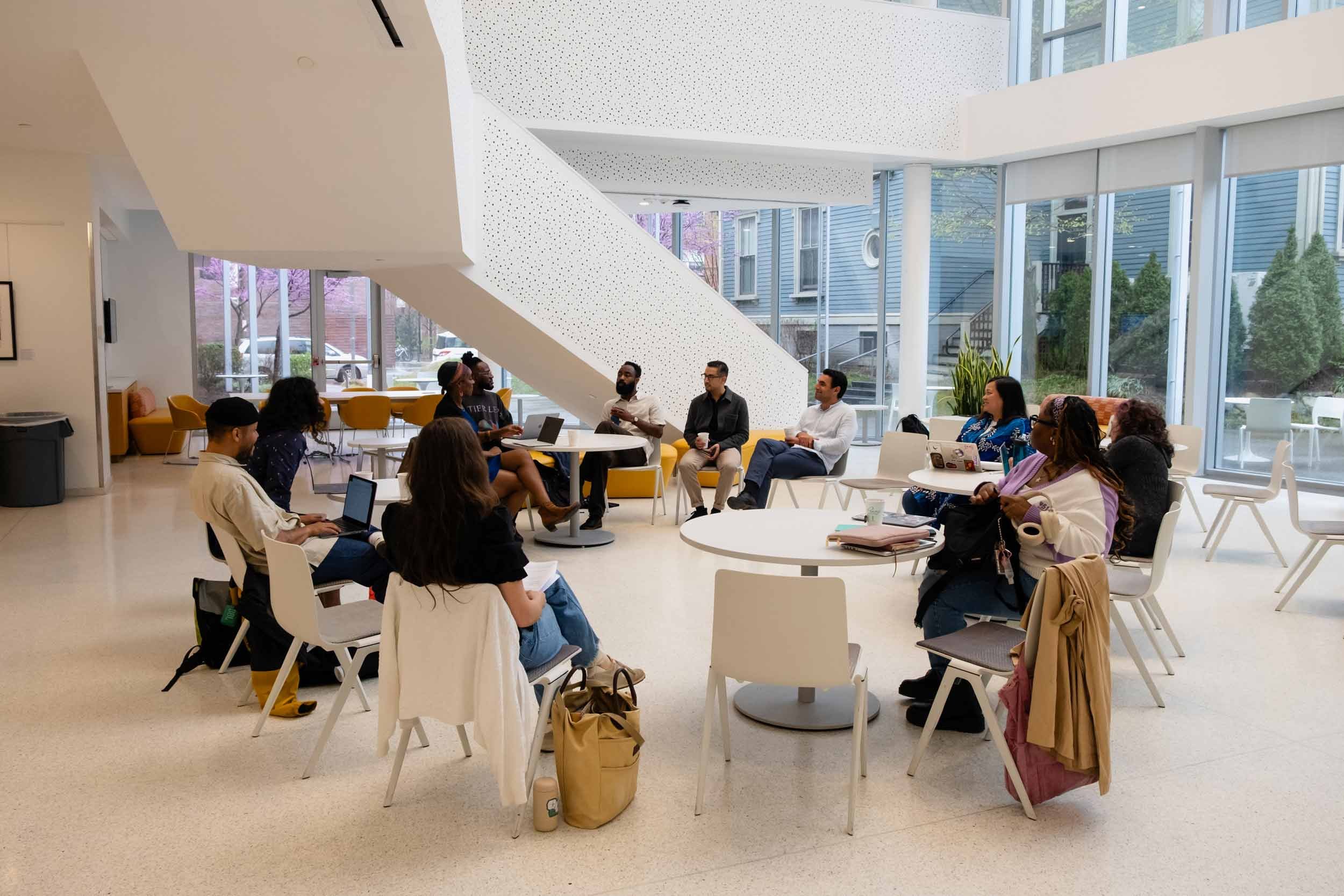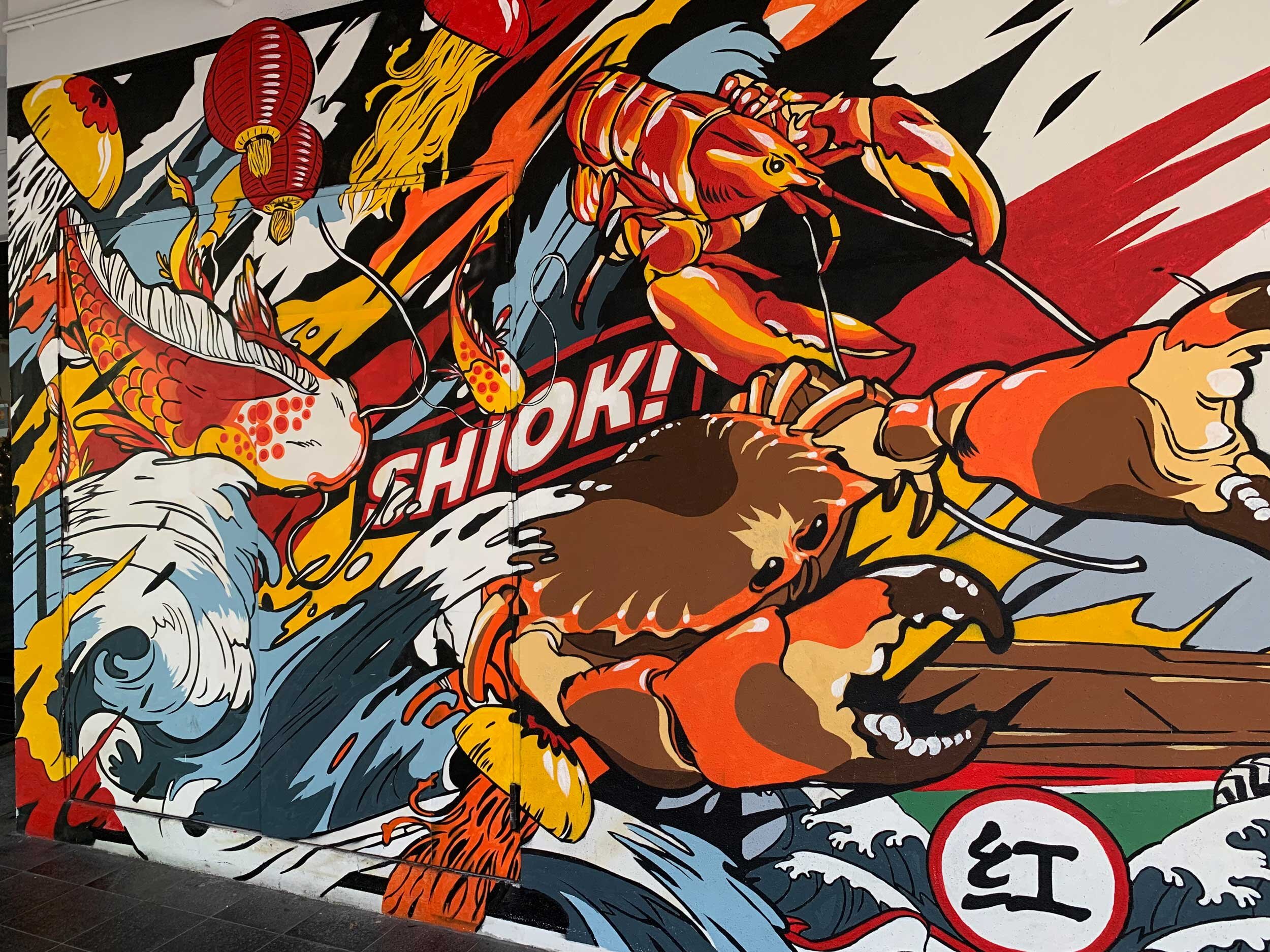
Teaching
In my university teaching, I strive to create inclusive, antiracist, human-centered pedagogical spaces. I also have experience as a trainer, mentor, and designer/facilitator for student career education. Read more about my approach to teaching and teaching experience below.
My Teaching Philosophy
My pedagogy aims to engage learners in collaborative, open-ended inquiry in and outside the classroom. I center an ethics of care in my teaching, focusing on relationship-building and context-sensitivity in my approaches. Through curriculum and lesson design, I work to refuse an unmarked status to whiteness, and respect the expertise that everyone brings to the learning environment through lived experience, prior intellectual preparation, and personal interests.
Mural near Clark Quay, Singapore, featuring the Singlish word “Shiok!” (the mural is an advertisement for Guinness, known locally to some as Ang Ji Gao / 红舌狗). This image was one of the recurrent motifs in my “Whose Hybridity?” course.
Active Courses
Sound and Symbols: Introduction to Linguistic Anthropology
Undergraduate Lecture
This introduction to the study of language in culture considers how language not only reflects social reality, but also creates it. We'll examine specific cases of broad current relevance, in the process learning how an analytical anthropological approach to language-use lays bare its often-hidden power. We'll consider how language creates and reinforces social inequality and difference, how language promotes and resists globalization, and how language is used creatively in performance, literature, film, advertising, and mass media. We’ll also consider how language does important social work in specific contexts, such as classrooms, courtrooms, medical settings, and political campaigns.
Language and Desire
Undergraduate Lecture
Language and desire have a complicated relationship. Sometimes, they are understood as co-constitutive; others, as opposing or incommensurate. This class will explore how language and desire have shaped, upheld, complicated, or contradicted one another across times, spaces, cultures, and societies. Drawing on interdisciplinary work from anthropology, psychoanalysis, queer studies, and more, this class will neither prematurely nor simplistically resolve the relationships between language, desire, and other categories. Instead, we will critically interrogate various perspectives on mind and body, individual and group, and the symbolic and material forces that impact what we strive toward, wish for, or find (dis)pleasurable.
Linguistic Theory and Practice
Graduate Seminar
This class is an introduction to theoretical and methodological issues in the study of language and social life. The course works to familiarize students with semiotic approaches to language as a multifunctional system and explore the implications of an approach for social scientific and humanistic research broadly. We will read across a range of fields and perspectives that inform linguistic anthropologists’ approaches in the present before linking these genealogies to areas of active contemporary research, including race, racism, and language-race co-naturalizations; materiality and multimodality; images and aesthetics; environment, space, and placemaking; production, maintenance, and transformation of institutional inequality in medicine, education, and border regimes; and the layered, intersectional exclusions of globalized, gendered-racial capitalism, among others.
Whiteness and Language
Undergraduate and Graduate Seminar
How has whiteness shaped language—not specific languages or sub-varieties of languages, but the very idea of language itself? This class presumes neither whiteness nor language as stable or self-evident categories. Instead, we explore how both categories have emerged together in and through projects of (racial, ethnic, gendered, sexual, classed, religious, etc.) colonial modernity. The class will introduce students to a critical interdisciplinary toolkit that they will collaboratively apply to a selection of case studies drawn from global colonial situations, culminating in an original mini-research project.
Central Area Map Sheet 1/1, from Singapore Master Plan 1958 (© Singapore Improvement Trust). Maps like this one made an appearance in my “Technologies of Language, Race, and State” syllabus.
Past & Future Courses
Past Courses
Southeast Asia and its Diasporas: a Critical Introduction
Brown University, 2024. This group independent study course was designed to conceptualize a distinctive brand and approach to Southeast Asian Studies at Brown. It encouraged students to move away from outdated conceptions of Southeast Asian Studies—particularly the Area Studies model in which most American academic engagements with Southeast Asian Studies are rooted—and instead emphasized a critical approach to develop the tools needed to think critically about the region and its contours. The course was open to all, but was designed to center Southeast Asian voices and those of the Southeast Asian diaspora at the heart of the learning process, thus challenging the persistent erasure and silencing of Southeast Asians in Southeast Asian Studies.
Language, Gender, and Sexuality
University of Chicago, 2023. This seminar critically examines how language, gender, and sexuality get made and made to relate to one another across times, places, media, (sub)groups, and oppressive structures. We will explore how language, gender, and sexuality anchor, enable, and constrain desire—its experiences, expressions, fulfillments, and repressions. Students conduct critical analyses of how language and other media are used to intersectionally construct gender and sexuality in institutions, social movements, current events, and our own (auto)biographies.
Global Social Movements
School of the Art Institute of Chicago, 2022. This course explores global movements for social justice in areas of environment, economics, education, language policy, electoral politics, and the politics of representation. Students examine the historical, institutional, sociological, and cultural dimensions of social justice from a comparative perspective. The course has two goals: first, to understand social justice as both global and local. Second, to explore social justice as a multi-scalar, internally contested site of struggle.
Asia–Pacific Colonizations
The University of Chicago, 2022 – 2023. This seminar focuses on Asia–Pacific colonial encounters from the 18th century onward. Approaching “civilization” from the perspective of socio-cultural contact, connection, and exchange, the course explores the dynamics of encounter, conquest, colonial rule, nationalism, and reckoning with colonial experiences across a broad range of times and spaces in East, Southeast, and South Asia.
Global Cities
School of the Art Institute of Chicago, 2022 – 2023. This seminar explores inequality in global cities from a comparative perspective. The course has three goals: first, to explore rather than resolve our understanding of global cities as multiple, contested terrains. Second, to deconstruct readymade spatial and social binaries such as global/local, urban/rural, citizen/non-citizen. Finally, to understand inequality in global cities as social, historical, and spatial, thus as intersectional, systemic, and located.
Technologies of Language, Race + State
The University of Chicago, 2021. This seminar introduces undergraduates to language, race, and the state as mutually entangled and mutually authorizing constructs. The course pairs readings from anthropology, history, geography, sociology, and STS (science and technology studies) with experiential learning in audio documentary and text-based game design as modalities of public scholarship.
Ethnographic Methods
The University of Chicago, 2021. This course introduces learners to ethnography as both a critical methodology and an embodied method. The course guides students through the process of developing and carrying out a mini-ethnography during the course term, or designing a long-term research project to be carried out in the future. The course comprises a combination of seminar-style discussions and peer-led critique sessions.
Whose Hybridity?
The University of Chicago, 2020. This course critically examines “hybridity” and related concepts—creolization, mixing, borderlands, etc.—across historical periods and global locales. Drawing from anthropology, cultural studies, postcolonial studies, sociolinguistics, sociology, history, and creative writing, this course is a guided tour of the uses and abuses of “hybridity” as a space of radical possibility, but also a space for the maintenance of whiteness.
Writing Pedagogies
The University of Chicago, 2016 – 2017. This seminar introduces undergraduates to the art and craft of college writing, focusing on developing portable tools for structuring and revising academic arguments. The course is paired with the required College Humanities Core Curriculum (HUMA), and pays attention to form and audience as a complement to the focus on content developed in HUMA seminars.
Intended Future Courses
I have prepared syllabi for courses that I have not yet had the opportunity to teach, and am developing new course themes based on my research, prior study, and collaborations. Below is a partial list of titles.
Just a Joke: Humor, Harm, Healing
Infrastructures of Experience
Decolonizing Images
Reading Sylvia Wynter: Unsettling Genealogies of the Human
2019 mentors and mentees in the U.S. Embassy Alumni Mentoring Program, after our closing session at Google Singapore
Mentoring & Career Education
Mentoring
2019 & 2020 | United States Embassy Alumni Mentoring Program, Alumni Mentor, Institute of Technical Education, Singapore
2013 – 2015 | Reva and David Logan Center for the Arts, Undergraduate Intern Mentor, University of Chicago
Career Education
Organizer
2024 | Out for Lunch with Dr. Vincent Pak (Undergraduates) | Co-organized with the Brown University Stonewall House | Brown University
2018 | Anthropological Approaches to the Current U.S. Job Market (Undergraduates and Graduates) | Co-organized with Owen Kohl | Department of Anthropology, University of Chicago
2017 | Professionalization and the Graduate Experience: A Panel with Early-Career Scholars (Graduates) | Michicagoan Conference | University of Chicago and University of Michigan Ann Arbor
2017 | What Next? Values-Driven Careers with Social Science and Humanities Degrees (Undergraduates) | Co-organized with Owen Kohl | Departments of Anthropology, Comparative Human Development, and Undergraduate Program in Global Studies, University of Chicago
Panelist
2025 | Gender and Sexuality in Anthropology (Undergraduates) | Department of Anthropology, Brown University
2022 | Society for Linguistic Anthropology Mentoring Roundtable: Meaningful Careers Beyond the Tenure-track (Graduates) | Seattle, Washington
2016 | Careers Outside the Academy (Undergraduates) | Department of Anthropology, University of Chicago
2015 | Graduate School Applications (Undergraduates) | Department of Anthropology, University of Chicago


